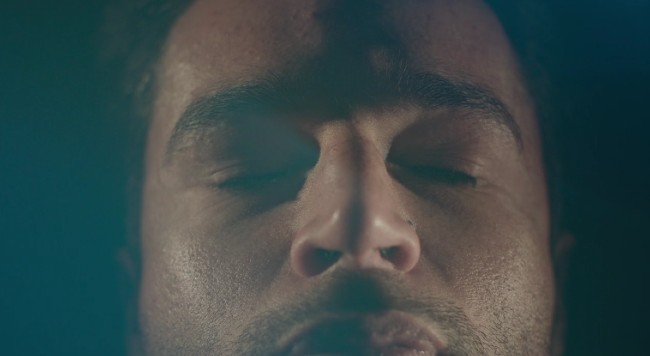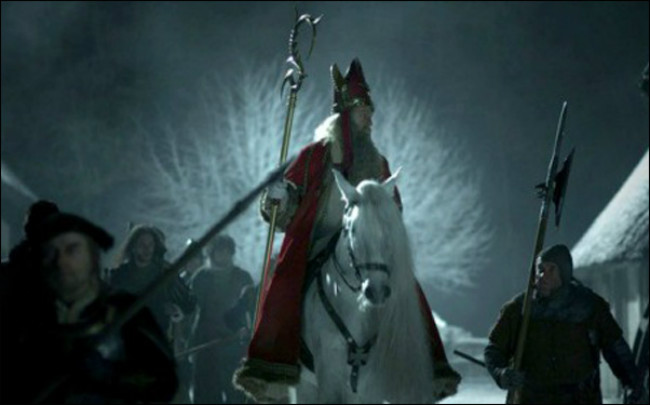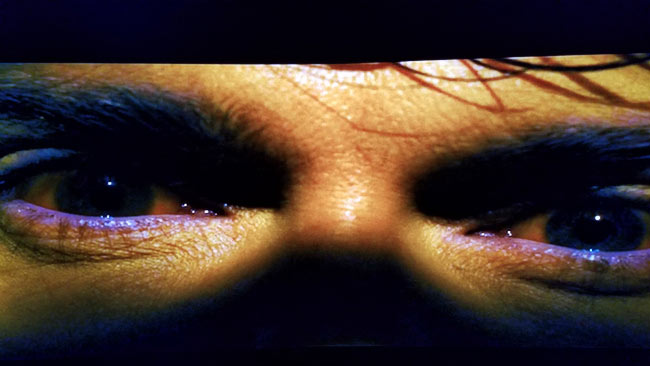Never Grow Old A Western of Violence and Beauty
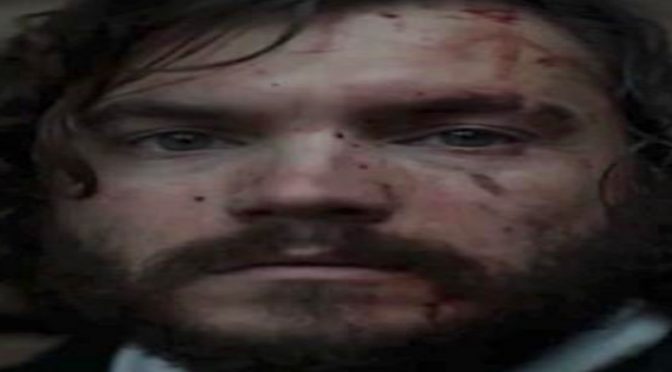
Westerns are being as made as often today as they once were. When a Western as good as Never Grow Old comes along we should watch and thank our lucky stars it was released. A review of Never Grow Old.
The Western genre has taken a hit the past several years. Hollywood studios aren’t backing, making, or supporting the Western like they use to even in the 90s or the early 2000s. Antoine Fuqua’s bland remake of The Magnificent Seven (2016) did nothing to jump start the genre. The attempted old school feel of In the Valley of Violence (2016) fizzled. The western in Hollywood, for the most part, is dead.
However, the Western isn’t totally dead. Directors, screenwriters, and studios from outside the United States are keeping the Western genre alive and have made some of the best Western films of the 21st Century. Irish filmmaker Ivan Kavanagh (The Canal) has added his name to the list of foreign directors, who for one reason or another, have tapped into a period of American history still ripe for stories.
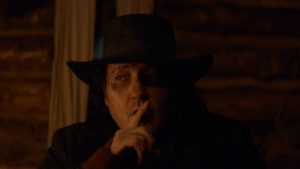
Never Grow Old is a dirty, nasty Western. It’s set in the town of Garlow in 1849. The streets are bogged down in mud and water, even the boards used to walk across the main road are sinking in the mud. The movie starts with Patrick Tate (Emile Hirsch, Into The Wild) walking into a church, rifle in hand, as John Cusacks’ Dutch Albert reads from the book of Revelations. It’s the present, the rest of the movie is a flashback told up to the point when we first me Tate.
Tate is Garlow’s carpenter and undertaker. His occupation relies on the population of the town. Garlow’s population has dropped and in turn so have the deaths. His dwindling business is due to Preacher Pike, played to religious fervor perfection by Danny Webb, and his church outlawing booze and prostitution. As a result, Tate’s business suffers. But Aubrey, Pat’s wife, tells him business will pick up. Indeed it picks up with disastrous results.
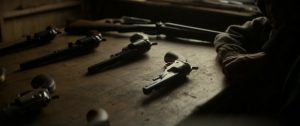
Albert Dutch and his two partners, an Italian who speaks no English and a man with his tongue cut out, come into Garlow with death on their minds. One of Dutch’s first acts as Garlow’s newest resident is to reopen saloon. Booze flows, prostitution flourishes, and dead bodies start piling up.
There’s more going on under the surface of Never Grow Old than a man wrapped up in making money off of a killer who’s keeping the town’s cemetery full. Indeed it is about a man making money burying murdered townsfolk, however, it’s not that easy. Tate isn’t embarrassed by making money of his dead neighbors. He’s more scared of what the neighbors will think when they find out how he’s making his fortune. Tate keeps the money, literal blood money, in a box next to his rosary buried in the ground in his barn. Both are to be kept hidden away from the town and his wife.
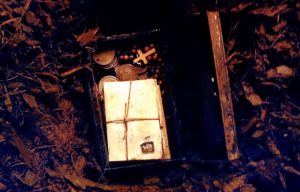
The first sermon we hear from Preacher Pike is how Garlow can be an example for the rest of America to follow. A shining example of what the new country can be like without the sins of booze and prostitution. In the back, Tate stands bored with a look on his face that says he would rather be anywhere but church listening to Pike.
We later learn Tate converted, leaving his Catholic faith, so his family would fit better in the Garlow community. It’s one of the first things Dutch picks on when talking to Tate. Dutch hits a chord. Pike and his followers never lifted a finger to help Mrs. Crabtree after Dutch killed her husband. Furthermore, Dutch argues they don’t like the Irish. Later, Dutch’s words come out of Tate’s mouth when he argues with his wife.

The dueling themes of religion and America course through the entire movie. Dutch is at odds with the church not just because they are against his saloon, but for what they stand for. It’s almost as if Dutch’s goal is to not only destroy the town, but the church too. It should be pointed out that no church member other than Preacher Pike lift a finger to stop the saloon from opening. In fact, based on the empty pews, many of the church members are lured to the saloon and its prostitutes.
Is Dutch the devil? His manner is cold, but matter of fact. He tells Mrs. Crabtree how he’s going to kill her husband with no more emotion in his voice than if he were describing the weather. It’s Cusack like we’ve never seen him before in a movie. It’s this same matter of fact tone and manner that lures Tate into being his personal gravedigger. If it were fear at the beginning of their relationship the gold stacking up in his box goes along way to alleviate his fears.
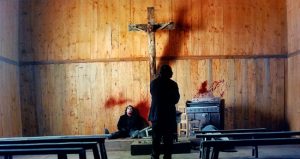
Tate may have been happy taking Dutch’s money if Emily, Mrs. Crabtree’s daughter, wasn’t hanged for killing a drunk in the saloon. Tate accepted the job of being at her handing over the objections of his wife. Something changed within Tate after the hanging. He wasn’t as eager to accept his role as Dutch’s gravedigger and stopped justifying the advances on his wife by Dutch’s henchman Dumb-Dumb.
The end begins with Preacher Pike burning down the saloon with people inside. He’s cleansing the sins of the town. Tate, for his part, is no longer afraid of Dutch. He’s changed, like the town, and the changing America both find themselves in. The last words Dutch says to Tate is “You’re American By Blood.” Tate then shoots him in the head.
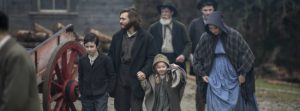
It’s 1849, the country is only seventy three years old. There’s plenty more violence to come.


